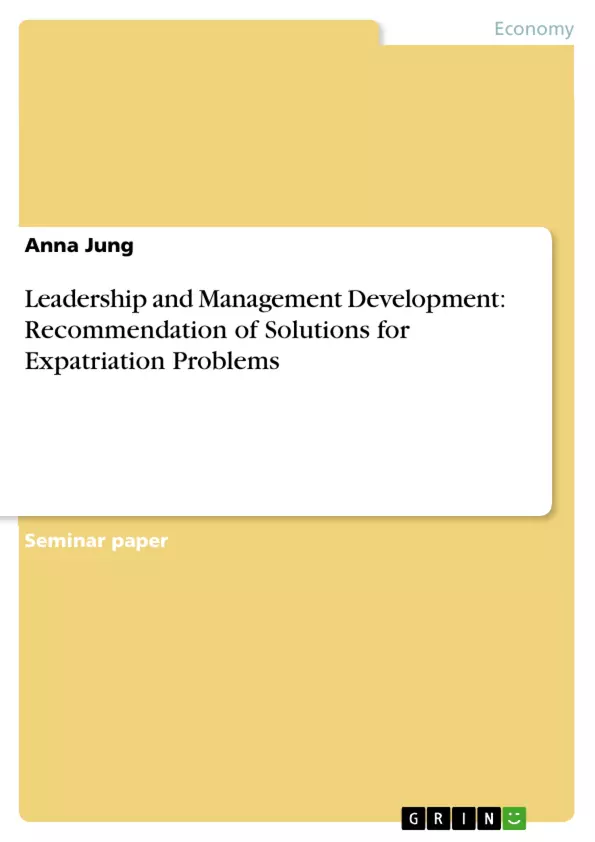Anglo-French Wines Direct (AFW), a multinational company based in the UK, established a
‘High Flyers Programme’ four years ago to develop future leaders to enable to achieve its
global growth objectives. The aim was to send them to one of the international subsidiaries
for two years and bring them back for a more senior position. However, the new HR Director
of AFW has discovered the following problems within this programme:
1. 25 percent of the expatriates returned home early due to dissatisfaction.
2. Over 35 percent of the expatriates were considered to be underperforming on the
assignment.
3. Around 30 percent expatriates left within a year of their return to England.
In order to achieve its business objectives, it is essential that AFW turns round this failing
programme into a leading-edge leadership programme. Particularly since AFW is a large
company and plans to expand its business further, it is according to Burgoyne (1988, cited in
Gold et al., 2010) vital that the programme has a high level of maturity, i.e. complexity and
structure, enabling to meet the organisational needs and objectives. Thus, AFW needs to take
a strategic and integrative approach and manage each stage of the ‘International Assignment
Cycle’ (See Appendix 1), i.e. recruitment and selection, hiring, preparation, expatriation and
repatriation, effectively. Accordingly, this report aims to present a mix of solutions regarding
each stage and provide recommendations for evaluating the new programme to ensure its
effectiveness.
Inhaltsverzeichnis (Table of Contents)
- Introduction
- Recruitment and Selection
- Hiring
- Preparation
- Expatriation
- Repatriation
- Evaluation of the Leadership Programme
- Conclusion
Zielsetzung und Themenschwerpunkte (Objectives and Key Themes)
This report aims to present solutions for improving a failing expatriate leadership program at Anglo-French Wines Direct (AFW), a multinational company based in the UK. The objective is to turn the program into a leading-edge leadership development initiative that effectively addresses the issues of high expatriate turnover, underperformance, and difficulty in retention.- Effective Candidate Selection
- Setting Clear Expectations and Goals
- Comprehensive and Tailored Training and Development
- Supporting Expatriate Adjustment and Integration
- Ensuring Career Progression and Return Opportunities
Zusammenfassung der Kapitel (Chapter Summaries)
- Introduction: This section outlines the challenges faced by AFW's "High Flyers Programme" and the need for a comprehensive and strategic approach to address them. It highlights the importance of managing each stage of the International Assignment Cycle effectively.
- Recruitment and Selection: This chapter focuses on the crucial importance of selecting the right candidates for the expatriate program. It emphasizes the need to identify individuals who possess the necessary personality traits, motivation, and readiness for international assignments. Additionally, the chapter addresses the role of dependants in the expatriate's success and the need for diversity in the selection process.
- Hiring: This section emphasizes the importance of setting clear expectations and goals for all stakeholders involved in the expatriate assignment. It discusses the need for action-evaluation, performance management, and ensuring promotion opportunities upon return to prevent talent loss.
- Preparation: This chapter addresses the importance of providing comprehensive pre-departure training and support, including cross-cultural and language training, e-learning resources, and informal briefings. The chapter also highlights the value of look-see visits to the host country and building relationships prior to arrival.
- Expatriation: This section focuses on the importance of ongoing support and development during the expatriate assignment. It emphasizes the need for tailored training programs, coaching, and mentoring to ensure the effectiveness and success of the expatriate's experience.
Schlüsselwörter (Keywords)
This report focuses on the key concepts of expatriate management, leadership development, international assignment cycle, candidate selection, training and development, cross-cultural adaptation, performance management, and career progression. It explores strategies for improving expatriate programs by addressing issues such as high turnover, underperformance, and difficulties in repatriation.Frequently Asked Questions
What are the common problems in expatriate leadership programs?
Common issues include early return due to dissatisfaction, underperformance during the assignment, and high turnover shortly after returning home.
Why is candidate selection critical for international assignments?
Effective selection identifies individuals with the right motivation, personality traits, and family readiness to adapt to a foreign culture successfully.
How can companies prepare employees for expatriation?
Preparation should include cross-cultural training, language courses, "look-see" visits to the host country, and clear goal setting.
What is the "International Assignment Cycle"?
It is a strategic process managing five stages: recruitment/selection, hiring, preparation, expatriation, and repatriation.
How can companies prevent talent loss after repatriation?
By ensuring clear career progression, recognizing the skills gained abroad, and providing senior positions upon the expatriate's return.
- Quote paper
- Anna Jung (Author), 2014, Leadership and Management Development: Recommendation of Solutions for Expatriation Problems, Munich, GRIN Verlag, https://www.grin.com/document/275448



